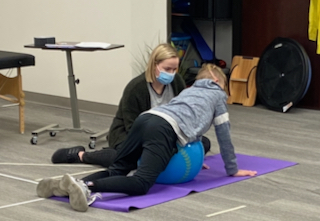By Madeleine Kates
Daily life can be a challenge for those who have experienced a medical setback that impacts their ability to perform everyday tasks. Occupational therapy focuses on meaningful activities and a holistic approach to meet a patient’s goals, while addressing the social, emotional, physical, physiological, and cognitive aspects of recovery.
Buffalo Occupational Therapy (Buffalo OT) is one of the few one-on-one outpatient neurological rehabilitation practices in Western New York, and uniquely combines both the medical and social models of practice to address a wide variety of client needs.
Individuals that may benefit from OT include those with stroke, balance disorders, neurodegenerative conditions including Alzheimer’s Disease and Parkinson’s Disease, cerebral palsy, movement conditions such as ataxia, or anyone in need of physical or cognitive rehabilitation. OT can benefit anyone of any age, and Buffalo OT has experience working with a broad spectrum of clients including children as young as 3 years old, and adults well into their 90s.
“Patients frequently come to us last to regain lost skills and abilities, but we want everyone to think of occupational therapy as the first step in the process of healing and recovery,” says Hannah DiFrancesco, Certified Licensed Occupational Therapy Assistant (COTA/L) and lead treatment practitioner at Buffalo OT. “The brain always has the capacity to form new connections, and there is hope for improved function after an injury, illness, or age-related decline.”
The complexity of simple tasks is often overlooked, but there are many steps and processes behind the actions needed to live independently, care for a home, prepare a meal, or perform the requirements of a job. Because Buffalo OT practices patient-centered, one-on-one care, each recovery plan is personalized to make sure the needs of each client are being met. Some plans have included goals such as gardening independently, sleeping without pain, putting on make-up, cooking with a mobility challenge, opening items, finding words during conversation, and even navigating a grocery store.
The treatment time depends upon the identified goals, as well as the conditions each patient is working through. There are programs for short-term rehabilitation after an acute injury such as a concussion, and long-term treatment options for those with neurodegenerative conditions to help them maintain function, manage their condition, and address cognitive deficits.
“The goal of our treatments is not only to break down barriers that are keeping our patients from living their best lives, but also to restore their hope by knowing that they are not facing their situation alone,” says DiFrancesco.
Offices are conveniently located in Amherst and West Seneca, and a referral is not needed. To book an appointment, call 716-235-3013, or find Buffalo Occupational Therapy online at https://www.buffalooccupationaltherapy.com/.
Madeleine Kates is a recent graduate of Niagara University with degrees in Environmental Science, Life Science, and Psychology. She holds certificates in Plant-Based Nutrition from Cornell University, and CHEF Coaching from Harvard University.












